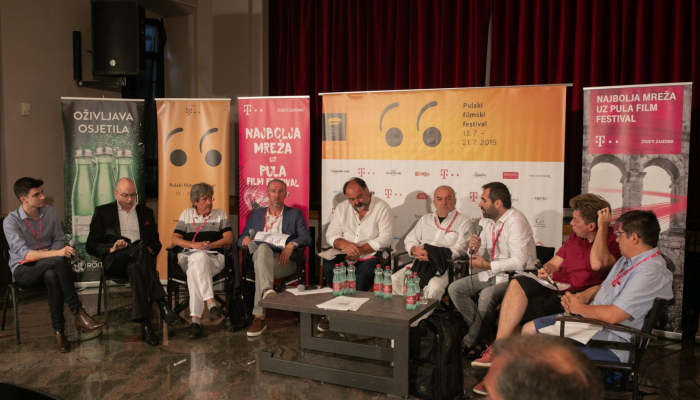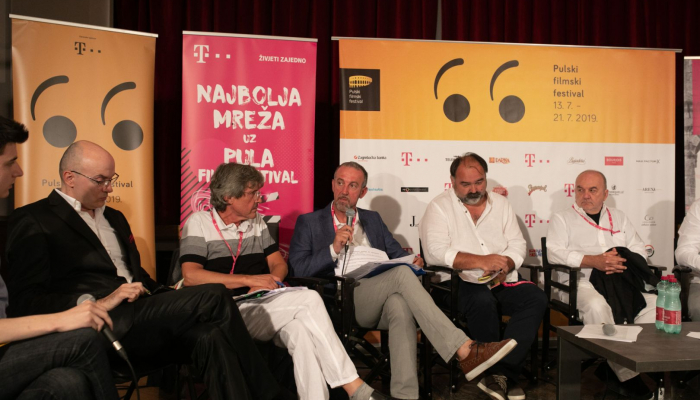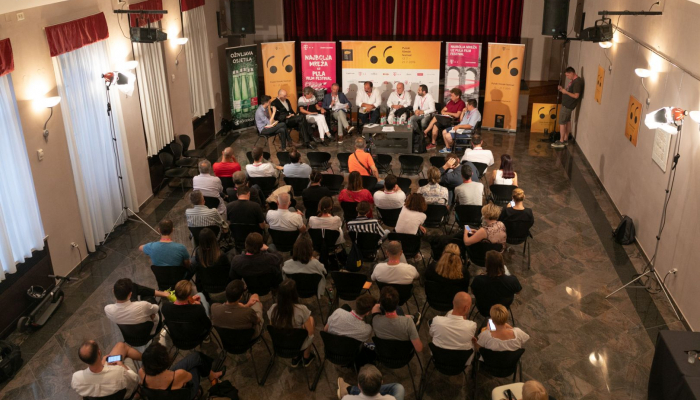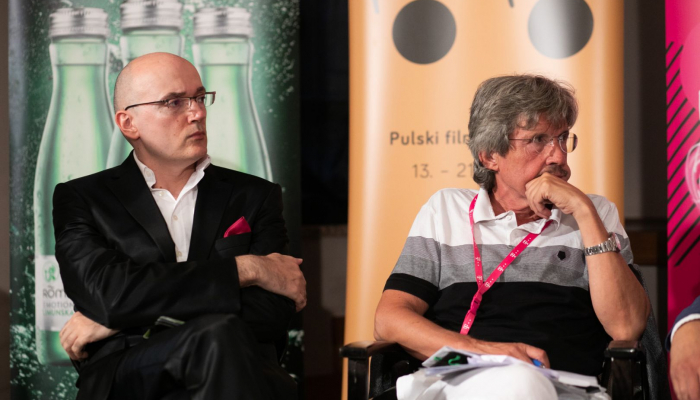Round table about the construction of a film studio in Croatia held at the Pula Film Festival




On Thursday 18 July, as part of the Industry programme of the 66th Pula Film Festival, a round table about the construction of a film studio in Croatia was held, at which the CEO of the Croatian Audiovisual Centre, Chris Marcich, the president of the Filmmakers Association of Croatia, Ivan-Goran Vitez, research associate at the Institute of Public Finance, Anto Bajo, and producers Damir Terešak, Danijel Pek, Hrvoje Matasović and Jozo Patljak participated. The moderator of the round table was Bruno Mustić, the head of the industry programmes.
The art director Zlatko Vidačković pointed out that this round table was only the beginning of the industry programme of the Festival, during which directors and selectors of important international festivals – from Cannes and Berlin to Busan and Palm Springs – international distributors and sales agents, directors of film centres from the region, foreign journalists and critics will all have an opportunity to view all of this year’s Croatian feature films and participate in a round table about the development of the public and panel discussions dedicated to the professional valorisation of present day Croatian cinematography within a European and world context.
Chris Marcich began the discussion by emphasising the need to carryout a thorough feasibility study for such a project.
At the Institute of Public Finance, Anto Bajo made an analysis of the effectiveness of government incentives in the film industry. ‘For every Kuna of paid incentives, 90 % of that Kuna is returned back to the state budget through value added tax and income tax’, he concluded.
Hrvoje Matasović pointed out that there’s a difference between the needs of Croatian filmmakers and foreign production companies. Foreign filmmakers for the most part need a number of stages, while the needs of Croatian film will be determined by the direction and plan in which the domestic production will develop. Furthermore, he believes that the studio should also have a post-production department so that productions would remain longer in Croatia and therefore be more usable.
Jozo Patljak joined in the discussion and asked what the economic sustainability of such a studio was and whether it’s something Croatian film needs, or should the focus be placed on foreign production.
Damir Terešak confirmed the necessity of constructing a studio. ‘We still need to see what kind of a model we should opt for so that the studio could be used for both foreign productions and domestic film. The construction of a studio is a necessity, as it will allow us to offer the whole package to foreign productions who currently choose other countries for interior filming because we do not have a studio.’
Anto Bajo presented his analysis of the number of filming days in Croatia and the productions that are continually growing. He emphasised that in the period from 2012 to 2018, the number of filmmakers has significantly increased (from 395 in 2012 to 1,196 in 2018), as has the number of extras (from 1,753 in 2012 to approximately 4,500 in 2018), as well as the number of filming days - a total of 346 in a calendar year.
Ivan-Goran Vitez considers Croatia to be an ideal filming location, as it offers diversity in just a half a day’s drive. Large productions need a studio because of the controlled conditions it offers. The director and the president of the Filmmakers Association of Croatia (HDFD) revealed that HDFD is interested in educational workshops and participation of the people who are new to the film industry during the process of constructing the studio.
The discussion also turned to the possible location for construction of the studio. The participants agreed that it should be in a city, however that it should be in a location that is accessible to a plane and to other transport. ‘The studio has to be in Zagreb because the majority of film workers are in Zagreb, but also because of the cost-effectiveness of travel and accommodation expenses for film crews’, stated Damir Terešak, and pointed out that Zagreb is in the near vicinity of Venice, Vienna and Budapest, which is particularly attractive to foreign producers.
Vitez joined in stating that the Filmmakers Association of Croatia is founding a branch in Split due to the great interest of foreign productions for the sea and the large number of filmmakers present here because of productions to date such as Game of Thrones, the film Mama Mia: Here We Go Again! and others.
Danijel Pek said that it is necessary to think about how this studio would best contribute to the Croatian film industry and that wider interests other than just financial cost-effectiveness need to be taken into consideration. The studio is something that, adds the producer, may completely change the Croatian film industry. He gave the example of Estonia which will open a film studio next year, and in whose construction the entire Estonian audiovisual industry was involved, with the assistance of the government and EU through incentives.
Chris Marcich concluded the round table with the statement that this project has a great chance of becoming a project of a national interest, and pointed out that there are already several interested foreign investors who have been looking around Croatia.
Pula Film Festival lasted until June 21. You can find more details about the festival and the award ceremony on the official website.
Cover photos: round table at the Pula Film Festival
